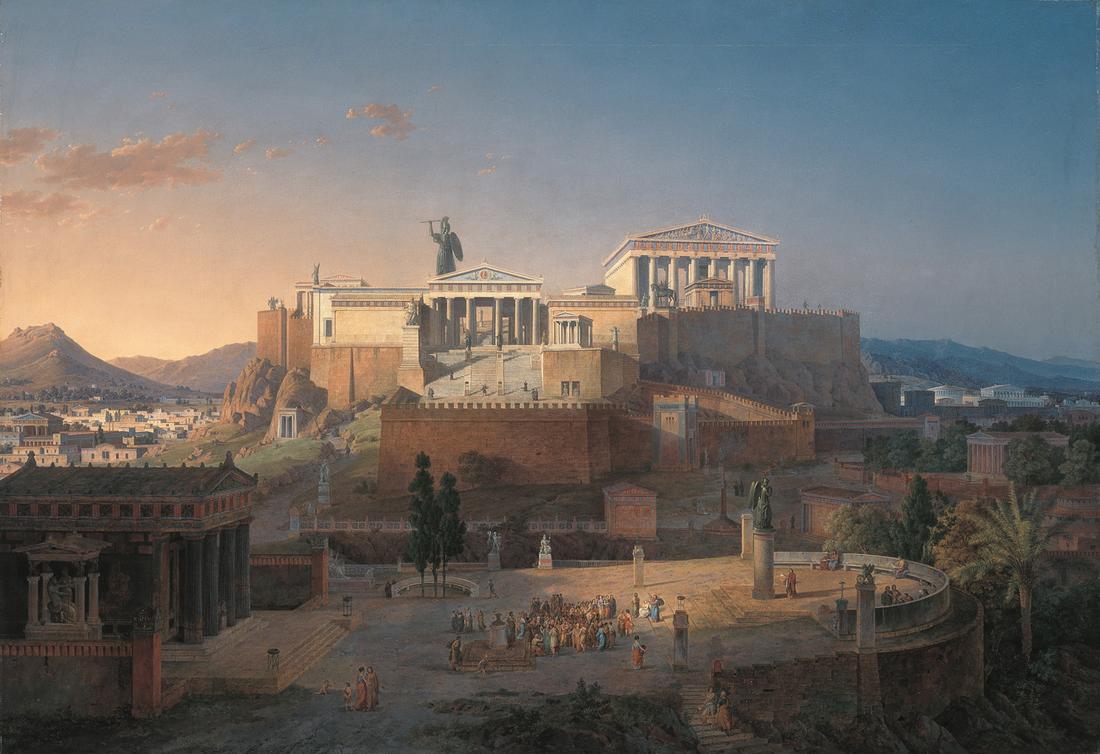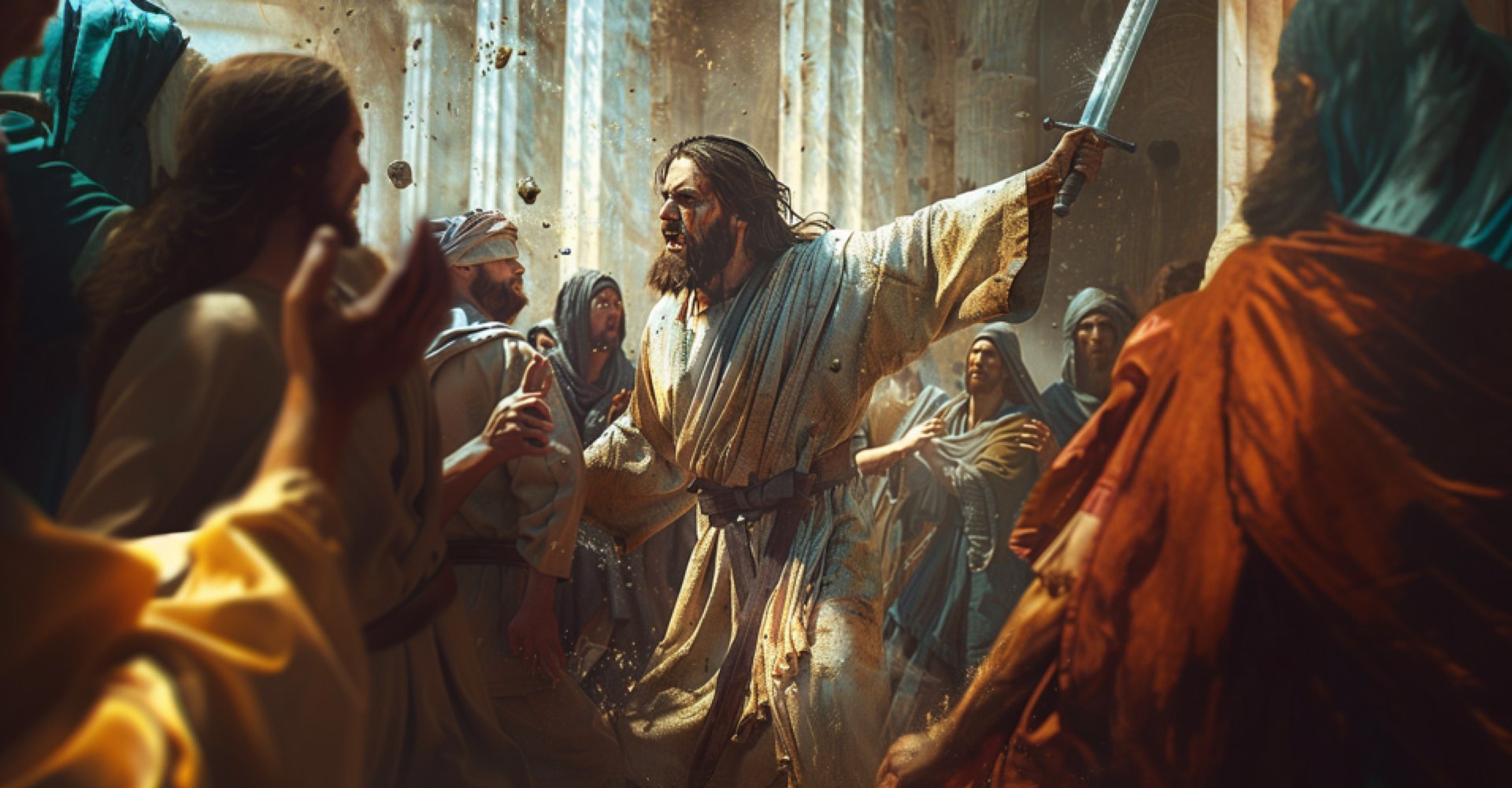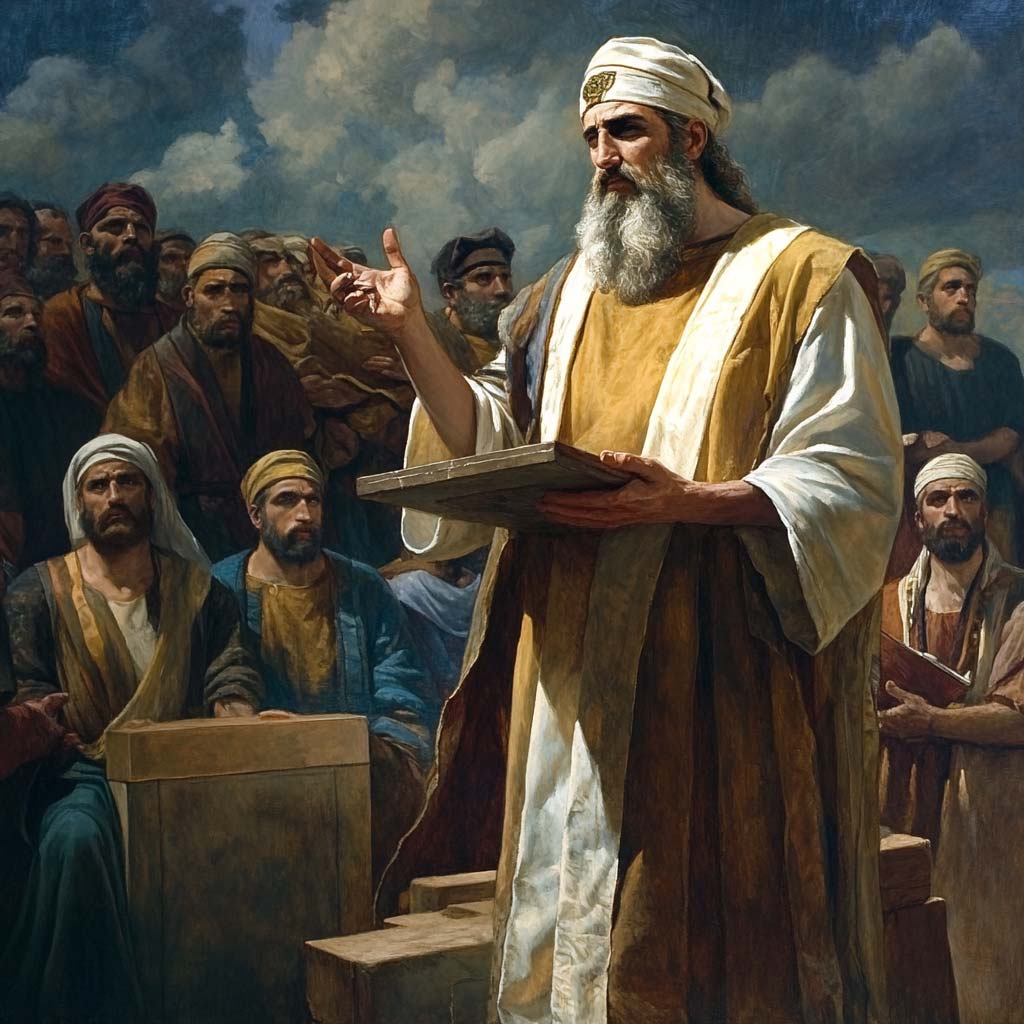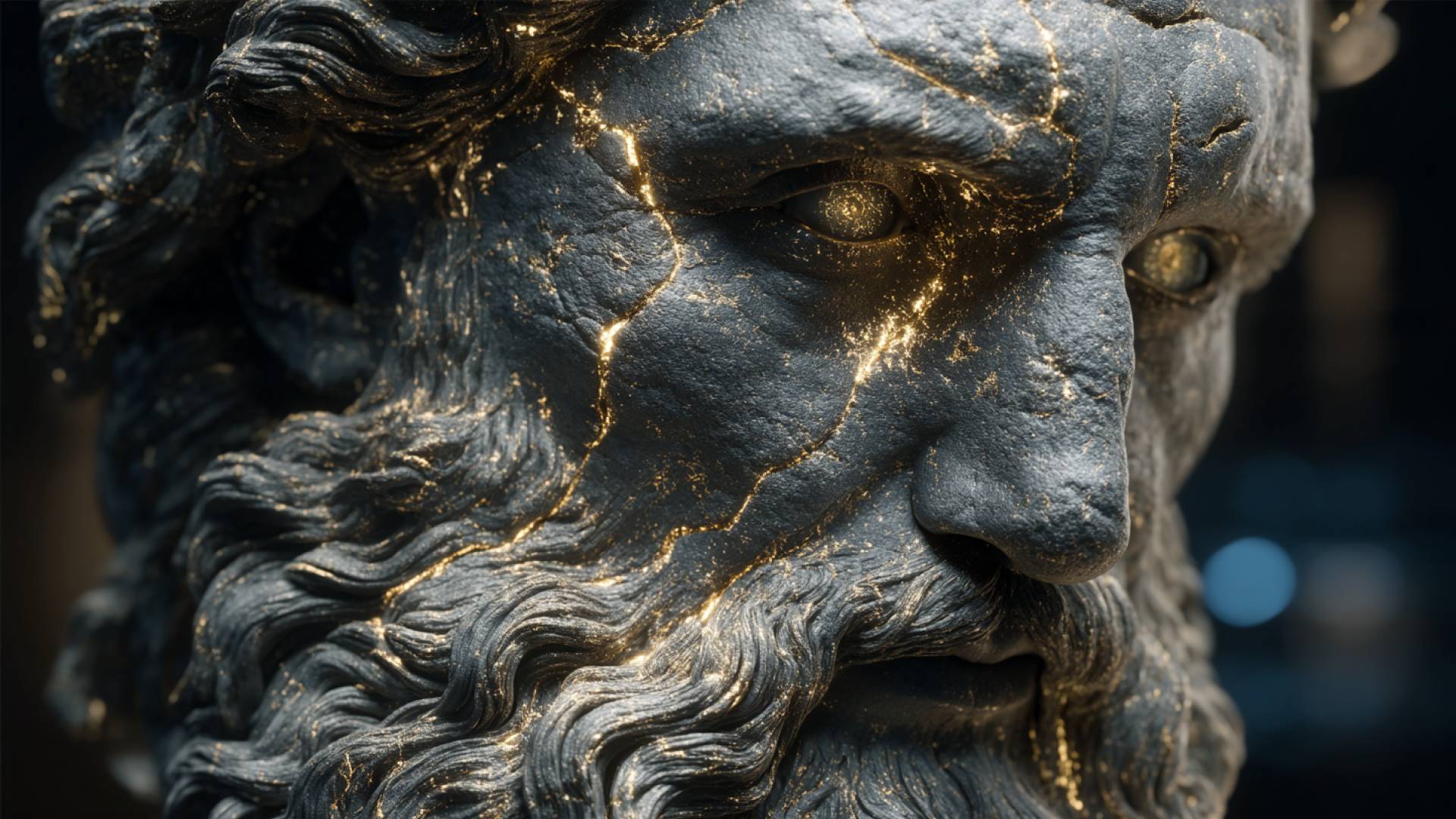Recent news reports speak of a rapprochement and dialogue between Christians and Jews. But the crux of the matter, according to the interpretation proposed here, is not goodwill around a table, but rather the nature of God at the center of their respective traditions. The starting point is clear: the God of the Jews is not reconcilable with the God of the Christians. This is not for the sake of controversy, but simply because of adherence to what the texts say when read literally and without theological superstructures.
The approach follows the usual “let’s pretend” method: we pretend that the texts say what they actually say, without forcing them into subsequent doctrines. The privileged lens is the Book of Jubilees (2nd century BC), a text accepted as sacred scripture by Coptic Christianity and which has come down to us in the Geez language. A literal translation, as stated in the UTET edition referred to, allows us to isolate the most explicit statements on the relationship between God and Israel, on the theme of election, predestination, the Sabbath, and the covenant
Literal reading and context of the Book of Jubilees
The Book of Jubilees is a major rewriting of biblical history from creation to the Exodus (roughly up to Exodus 12), dictated to Moses by God through the angel of the Presence (malach, who “is always with him”). The context is important: the author, probably close to the Essene milieu, writes in a Hellenized Middle East, where Greek philosophy pushes towards universalistic concepts and a metaphysically perfect God. Despite this, Jubilees reaffirms the ancient idea: the God of whom the Scriptures speak is the God of Israel, not an abstract universal entity, and establishes an exclusive relationship with a concrete family.
“Write for Moses… until all know that I am the God of Israel, the father of all the children of Jacob and the king on Mount Zion. And Zion shall be holy, and Jerusalem also.”
(Jubilees, chap. 1; quotations taken from the literal translation by UTET)
From the outset, therefore, the horizon is particular: God does not present himself as “God of the world” in the modern sense, but as God of Israel, King of Zion, Father of the children of Jacob. This is the key that Hellenism cannot dissolve.

“We came to Abraham”: plurality and concreteness
Jubilees takes up an episode already known in Genesis 18: the arrival at Abraham’s house of three visitors, recognized as belonging to the group of the Elohim. In the Jubilees account, the voice is “God’s,” but the text preserves significant traces:
“We came to Abraham at the well of the oath… we returned in the seventh month…”
This first person plural is not a stylistic whim; in a literal reading, it recalls the group dimension of those beings. In parallel, the author emphasizes that from Isaac—not from all of Abraham’s sons—will come the holy lineage, destined to be “part of the Most High” and to be under his dominion when “the Lord, having descended to Earth,” will dwell among them. Late Jewish theology will prefer an immobile and “other” God; Jubilees preserves the operational, historical, localized trace: a God who descends, stays, governs, makes covenants, demands signs.
Predestination and election: before the choice, there is separation
The text is clear: election precedes history. Even before family lines develop, they are predestined:
- Isaac is designated as holy offspring;
- Ishmael and his descendants, although sons of Abraham, are not accepted;
- Esau, twin brother of Jacob, is excluded;
- only Jacob/Israel is sanctified and gathered “among all the sons of men.”
Sanctification (qadosh) means to separate, to set aside for someone: it does not indicate universal moral perfection, but belonging. Jubilees even specifies that not all peoples were sanctified and that the Sabbath, to which we return, is a sign and privilege of Israel.
This logic is consistent with Deuteronomy 32, where Elyon “divides the nations” and assigns to each a son of the Elohim; Yahweh takes Jacob as “his portion” and Israel as “his inheritance.” The picture is political-sacred: the nations have rulers (angels/Elohim); Israel does not: over Israel, its God reigns directly, who “gave no angel power over Israel.”

The covenant and the sign: circumcision as a “document” of belonging
Circumcision is, in Jubilees, an eternal and generational covenant that seals belonging. It is not benevolent ethical advice, but a mark of alliance: an identity sign through which Israel recognizes and is recognized. The author reiterates that the covenant does not concern the excluded branches (Ishmael, Esau). In modern terms, we could say that Jubilees puts in writing the “exclusive contract” that regulates Israel’s rights and duties towards its God.
This reading clashes with a later universalistic view, but it is perfectly in line with the most ancient biblical lexicon, where covenants are family, tribal, and national, not “humanitarian” in the philosophical sense.
A God who acts in history and with time
Another often overlooked element is time. Jubilees opens with the division of years, seven-year periods, and jubilees. The God described is attentive to calendars, orders, and rhythms; he is not the abstract Eternal One who “has no time,” but a lord of history.
“This account of the division of time is according to the law and for testimony… calculated in all the years of the world.”
Hence the feeling of “contradiction” with respect to the theology of immutability. Where Hellenistic thought pushes towards a perfect, impassive, immutable God, Jubilees and large portions of the Old Testament continue to show an active divinity: one who descends, blesses, threatens, repent, changes his mind, punishes or suspends punishment. History, in the words of the transcript, “explodes” and refuses to be buried under the concrete of subsequent elaborations.

Saturday: the key to separation
The key point of “separation” is the Saturday. In Jubilees, God chooses the lineage of Jacob and inscribes it as his firstborn son, sanctifying it for himself:
“Among those I have seen, I have chosen… the lineage of Jacob… And he did not sanctify all peoples, but sanctified only the people of Israel. To them alone did he grant to eat and drink and rest in it on Earth.”
The Sabbath is not a gift “tailored to humanity”; it is a sign of identity granted to Israel. From the perspective of the Jubilees, the others are “gentiles” from the beginning, predestined not to be part of this separation. Here we see the irreconcilable distance from the Christian perspective, which universalizes the signs (baptism, Eucharist, Sunday) and proposes a God for all.

From the “God of the Fathers” to the “perfect God”: the theological revolution
The editor of the UTET edition, professor emeritus of Biblical Philology (Hebrew and Aramaic), notes that the author of Jubilees is influenced by the concerns of his time: the emerging Jewish (and later Christian) theology is moving towards a single God, creator ex nihilo, omnipotent and immutable. These concepts are not clearly present in the ancient Bible, where bara’ does not necessarily imply creation from nothing and where God interacts and compromises in history.
The tension is explicit: the perfect God “cannot but be immutable,” but the stories continue to represent a ruler who moves, decides, claims a people for himself, claims property, and defends borders. The Old Testament and the studies cited in the transcript (e.g., Jewish scholar Lia Bat Adam) paint a character profile of Yahweh that is anything but “Apollonian”: jealous, exclusive, demanding, punitive, wrathful, fierce, but also wise and terrible. A personality that is “not easily satisfied,” far removed from the ideal of the immobile Prime Mover.
Deuteronomy 32: a geopolitical map of the ‘sacred’
To understand the context, Deuteronomy 32 is decisive: Elyon ‘the Most High’ divides the nations among the sons of Elohim; Yahweh is given Jacob. The result is a veritable geopolitics of the sacred:
- every nation has its own angel/commissioner;
- Israel is under Yahweh without intermediaries;
- the law and the signs (Sabbath, circumcision) apply to Israel;
- the other peoples are “the nations”, goyim, outside sanctification.
This map contrasts with later Christian universalism, which posits one God for humanity and salvation extended to all.

Why create “other peoples?”: the provocation and the possible answer
If God wants a people for himself, why bring others into the world? The question, in Jubilees, remains unsettling. The transcription offers a clue that comes from the Talmud, collected in a passage from Shimon ben Zoma: the work of the nations would make life easier for Israel. It is a moderate formulation compared to other statements found in the vast Talmudic corpus, but it suggests an instrumental function of the nations towards the chosen people. It is not a dogma, but an ancient point of view that helps us understand why “others” exist in the logic of a particular and partisan God.
Two paths of faith with no possibility of encounter
At this point, the outcome is inevitable: the God of the Jubilees/Old Testament and the God of Christianity do not overlap. The former is local, exclusive, patrician (in the sense of pater familias), bound by covenants, ruler of his people; the latter is universal, metaphysical, immutable, “God for all.” For this reason, human, political, and cultural dialogue is always possible and desirable; but theologically, the two figures remain irreconcilable.
- The Christian way demands faith in what cannot be seen, adherence to a universal mystery.
- The Jewish way requires trust in the keeping of promises made over time by Yahweh to his people.
These are different acts, based on different images of God. The attempt to “eliminate misunderstandings” risks overlooking the core: it is not a misunderstanding of terminology, but two incompatible theologies.
My conclusion: read the texts thoroughly
The Book of Jubilees, read literally, does not diminish but accentuates the particular profile of the biblical God: he descends to Earth, chooses a lineage, demands signs, establishes calendars, sanctifies a day for that people, excludes other family branches, and does not entrust Israel to any angel. He is a historical, exclusive, demanding God: a ruler among other rulers (Elohim), with Elyon at the top.
Hence the break with the universal God of Christianity. It is not a question of theological good manners; it is the ontological difference between two models of God. One can and must dialogue about ethics, memory, peace, but without pretending that the texts say what they do not say. History (and Jubilees is “sacred” history in the form of a chronicle) resists the concrete pouring of theoretical arrangements. And if we listen to it, it reminds us that it is not always “the God of the world” who speaks: often, it is the God of Israel who claims Israel.
As always, the proposal is methodological: let’s pretend that the texts say what we read. And then, as free readers, each of us can draw our own conclusions.
Frequently asked questions (FAQ)
What is the Book of Jubilees?
It is a “chronological” rewriting of biblical history, from creation to the exodus from Egypt, presented as a revelation to Moses through the angel of the Presence. It is considered canonical in some traditions (such as the Copts) and parabiblical in others.
Is the God of Jubilees universal or particular?
Particular: he explicitly identifies himself as the God of Israel, “father of the children of Jacob” and “king of Zion.” The relationship is exclusive and based on a covenant.
Why is circumcision central?
Because it is the sign of the eternal covenant: a bodily document certifying Israel’s membership. It does not apply to all of Abraham’s descendants: Ishmael and Esau are excluded.
What role does the Sabbath play?
It is the sign of identity granted only to Israel: God does not sanctify all peoples on the Sabbath, but separates Israel and grants them to “eat, drink, and rest” on that day on Earth.
What does Deuteronomy 32 teach?
It shows the division of nations among the sons of the Elohim: Yahweh takes Israel as his own inheritance. The result is a plural picture of “supernatural” powers, with Yahweh directly above Israel.
How did we arrive at the “unchanging” God of Christianity?
Through a theological evolution that began in the post-exilic Jewish environment and was accelerated by contact with Hellenism: the one God, creation from nothing, and immutability were affirmed. But the oldest texts preserve the memory of a different God of the Fathers: mobile, interactive, demanding.
—
Reference text: Apocrypha of the Old Testament. Edited by Paolo Sacchi, vol. I. Book of Jubilees (translation by Luigi Fusella). UTET – De Agostini, Novara, 2013.




